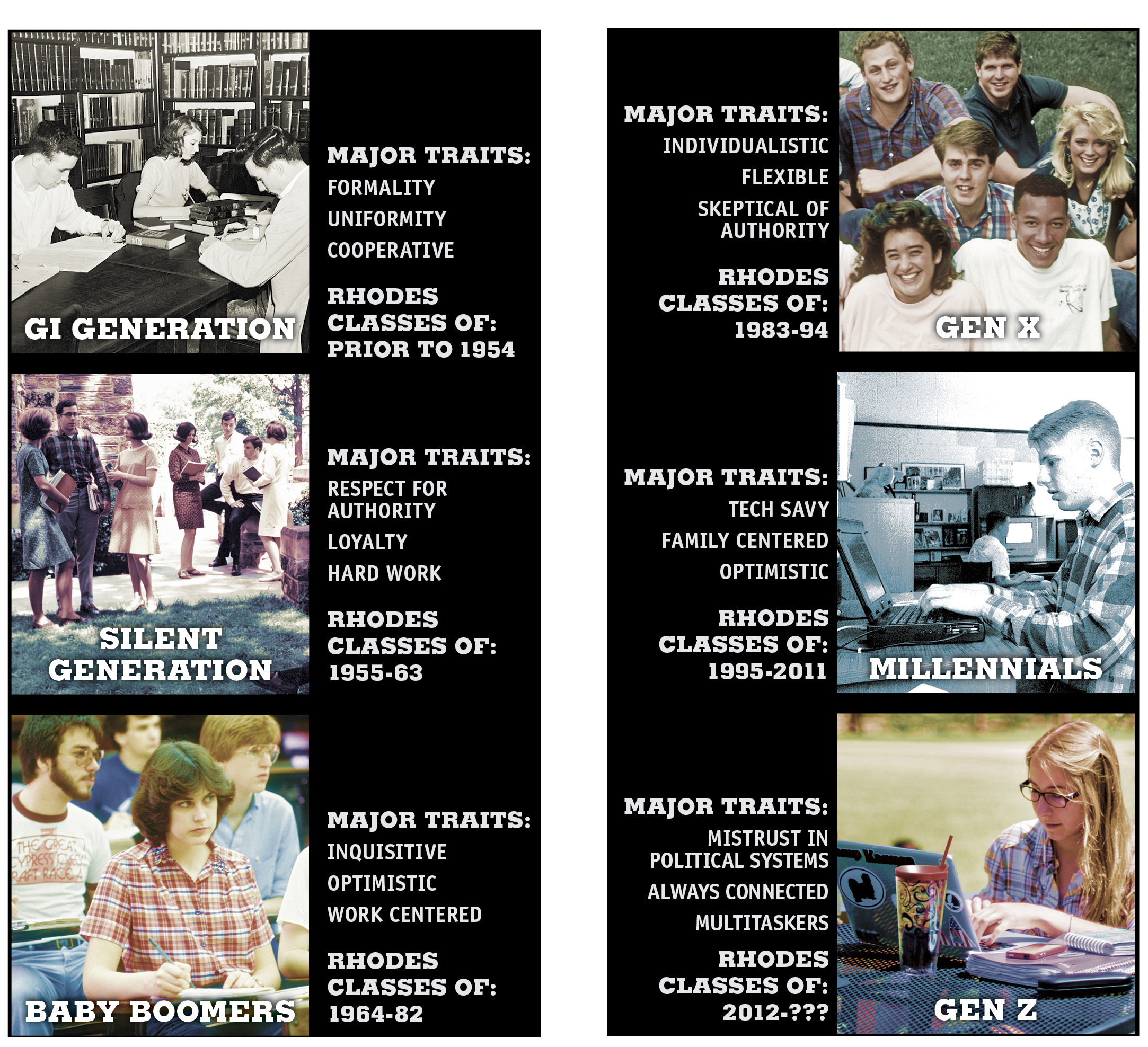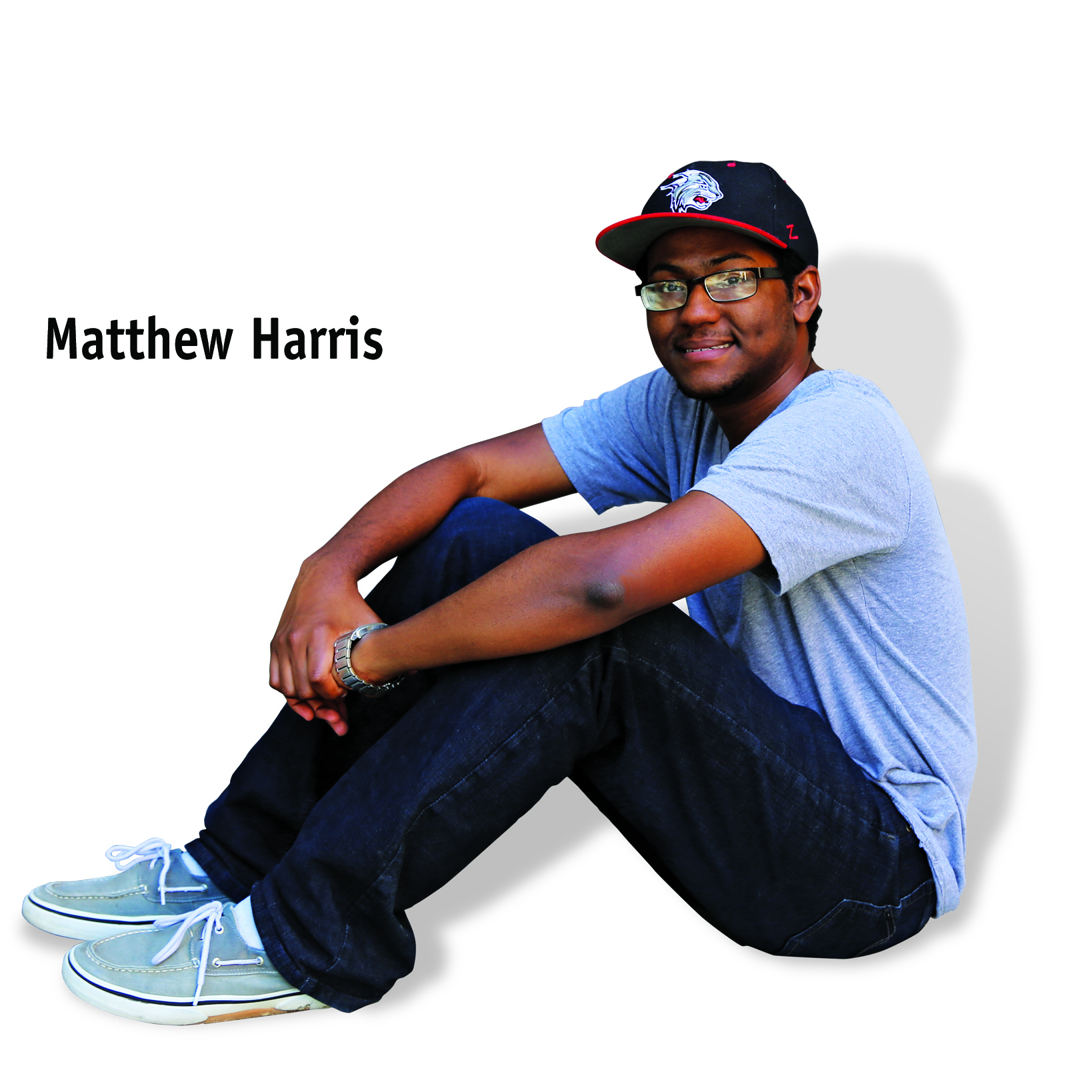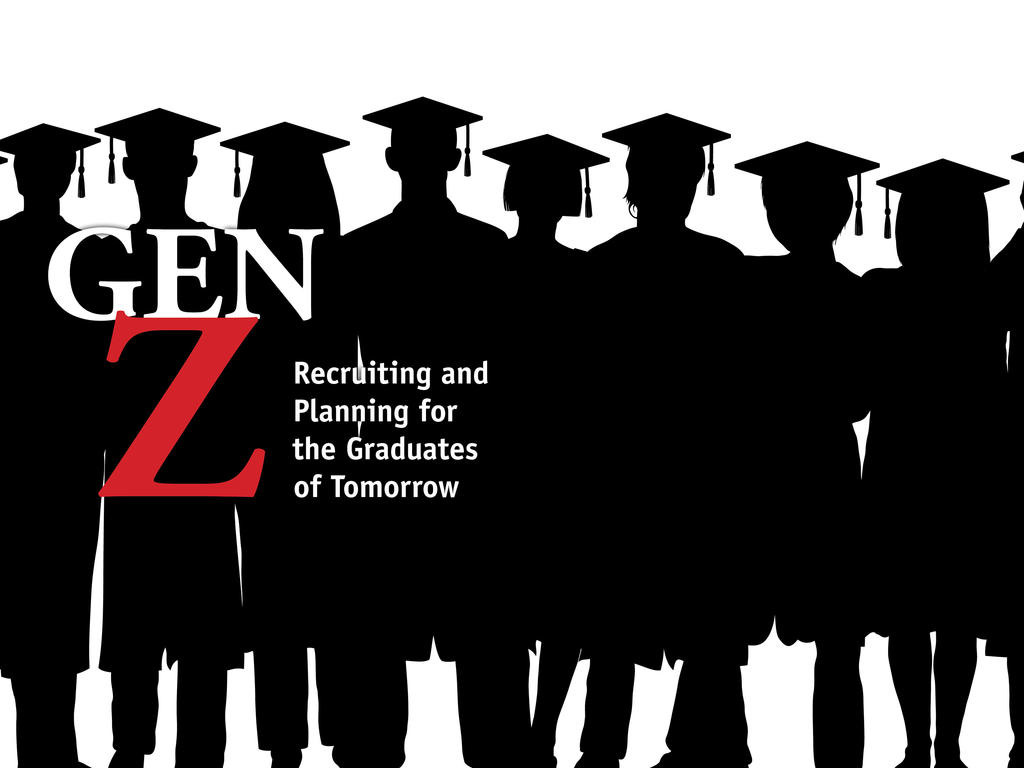There’s a big change under way at Rhodes. It’s far less noticeable than the construction of the new Robertson Hall science facility rising on campus. It’s unrelated to the search for the college’s 20th president, who will succeed President William E. Troutt in June 2017. And it’s less visible than the football team’s return to wearing red helmets. Nonetheless, this change will have a lasting impact on the college for, well . . . a generation.
Although it’s hard to pinpoint the exact date or time when it actually started, Rhodes is beginning to welcome the next generation of students. They are known variously as Gen Z, the iGen, the Homeland Generation, or Centennials. And while they don’t appear much different than their Millennial predecessors, their defining characteristics are distinctive. In response, Rhodes, as it has throughout its history, is evolving to meet their expectations while remaining fully grounded in the core values that have characterized the college since its founding.

Simply defined, a generation is a group of people born and living during the same time period whose shared experiences influence their thoughts, values, behaviors, and reactions. It must be emphasized, though, that shared experiences vary greatly by race, gender, class, region, family, religion, and more.
When the college moved to Memphis in 1925, the first students were members of what some have called the GI Generation. They were community minded, assertive, energetic, and concerned with personal morality.
The next group to call Rhodes home was the Silent Generation, who were children of the Great Depression and World War II. The “Silent” label refers to their loyalty, respect for authority, and aversion to conflict. They were on campus until the early 1960s.
From 1964 to the early 1980s, the post-war Baby Boomers arri ved at Rhodes, confident in a bright future filled with prosperity. During this time, consumer goods were more abundant and attainable than ever before, and many families bought brand-new suburban homes.
ved at Rhodes, confident in a bright future filled with prosperity. During this time, consumer goods were more abundant and attainable than ever before, and many families bought brand-new suburban homes.
The following decade and a half, the college welcomed Generation X, who are often described as “latch-key kids.” They grew up street-smart but isolated, introspective, disenfranchised, and distrustful of authority.
Next, the college was home to the Millennials, who lived through the 9/11 attacks and two economic crashes. According to a 2013 Time magazine cover story, Millennials are “over-confident, self-involved, and entitled.” They have also been called open-minded, self-expressive, and committed to a lifestyle that balances work with play.
And now it is Gen Z’s time to make its mark at Rhodes. Characterized as self-starters, self-learners, and self-motivators, Gen Z members are considered mature and in control, and eager to make a difference right now. They are focused on creating their own opportunities rather than relying on others. They are passionate about social justice and have moved beyond simple definitions of race, ethnicity, and sexuality to define cultural identities. And Gen Z members are arriving on campus already armed with impressive résumés, clear goals for the future, and high expectations of Rhodes.
“Rhodes has always attracted top scholars,” says J. Carey Thompson, vice president for enrollment and communications at Rhodes. “But increasingly, our students are arriving having already accomplished a great deal while still in high school. They are experienced researchers, entrepreneurs, service leaders, and social advocates.”
First-year student David Vanderwall from Seattle, WA, began researching cancer while in ninth grade. “I felt there was something I could do to self-start my career,” he explains. “I knew then that oncology was what I wanted to do, specifically clinical research. So, I started researching cancer on my own, specifically how it works genetically.”
His sophomore year, he reached out to a local oncologist, who provided him with the opportunity to assist with gene therapy research for stage-four cancer patients. “My research was focused on finding mutations in their genomes,” says Vanderwall. “Once we learned what mutations they had, we determined if there were any inhibitors on the market that could target these genes.” By his senior year, he had worked with more than 60 patients throughout the Northwest, increasing their survival rate by two months.
 “I am preparing myself for the next step, which is medical school,” he says. “I chose Rhodes in large part because of the college’s biochemistry major and its partnership with St. Jude. I want to do the most I can do right now in order to prepare myself to be the best oncologist I can be.”
“I am preparing myself for the next step, which is medical school,” he says. “I chose Rhodes in large part because of the college’s biochemistry major and its partnership with St. Jude. I want to do the most I can do right now in order to prepare myself to be the best oncologist I can be.”
Matthew Harris ’20 from Austin, TX, also began charting his life’s course while still in high school. Channeling his experiences as the only African American male at his highly competitive magnet school, he started a mentoring program for underprivileged kids at a local middle school, which he eventually turned into a nonprofit organization.
“I created a curriculum focused on astronomy, computer science, robotics, and creative writing,” Harris explains. “When I started, most of the students could not name two planets. Some could not read. By the second semester, they were discussing general relativity and black holes. And their state test scores improved dramatically. All they needed was confidence.”
Harris was attracted to Rhodes because of the college’s emphasis on community service. He is a service scholar with the Bonner program and, within his first month on campus, began making a difference by helping build a park at a community center called Shasta Central. Soon, he will work with the students at Springdale Elementary to build a new on-campus garden.
“My ultimate goal at Rhodes is to leave a legacy,” he says. “Not for myself, but for the college and the city of Memphis.”
Vanderwall and Harris aren’t the only first-year students who personify Gen Z’s defining characteristics.
Before enrolling at Rhodes, Keerthi Raja ’20 from Odessa, TX, had her research cited in the European Journal of Endocrinology. Lydia Slyter ’20 from Louisville, KY, helped raised more than $50,000 for the University of Kentucky Pediatric Oncology Clinic. Charlotte, NC, native Will McLain ’20 launched a popular blog called “[Skin Deep],” which focuses on racism. And Chandler Hall ’20 from Houston was the first openly gay senior patrol leader of his Boy Scout troop, breaking down barriers and stereotypes in an organization he loves.
 According to Thompson, the majority of these new students are choosing Rhodes for very specific reasons. “We see more students selecting Rhodes for one of our ‘hooks,’” he explains. “The ‘hook’ of one our strong academic programs. Or our partnership with St. Jude. Or the ‘hook’ of doing service or research in a major city. Rhodes has more ‘hooks’ than most, and we certainly use them to recruit top students from across the country and world.”
According to Thompson, the majority of these new students are choosing Rhodes for very specific reasons. “We see more students selecting Rhodes for one of our ‘hooks,’” he explains. “The ‘hook’ of one our strong academic programs. Or our partnership with St. Jude. Or the ‘hook’ of doing service or research in a major city. Rhodes has more ‘hooks’ than most, and we certainly use them to recruit top students from across the country and world.”
Thompson also points out that this generation of top students expects to live and learn in an environment that exposes them to diverse viewpoints, people, and experiences. And, over the past few years, administrators, faculty, and students have worked closely together to ensure that the college’s culture aligns with this generation’s expectations.
“Our newest students have already received ‘Diversity 101’ training in high school,” says Dr. Noelle Chaddock, the college’s associate dean of academic affairs for diversity and inclusivity, a new position established this past spring. “So, they know and use language that past generations didn’t use. They understand the importance of advocacy and how to access it. They want to be at a place where they can lead and contribute.”
Social justice blogger McLain certainly agrees. One of the ‘hooks’ that attracted him to Rhodes is the opportunity to participate in the college’s Africana Studies program while living in a city like Memphis. “The entire first-year class visited the National Civil Rights Museum as part of the new First-Year Experience,” he says. “It was just awesome. I also attended the We Wear the Masks performance on campus, which deals with personal identity issues and inclusivity, and was written and produced by Rhodes students. Both of these events made me even more excited about being here and demonstrated that Rhodes really does care.” (See page 8 for more on We Wear the Masks.)
“Young people move culture,” adds Chaddock. “And they are educating the adults about emerging social issues. Together, we are attempting to reshape the way that Rhodes intentionally creates space for all students, regardless of race, gender, sexual orientation, socio-economic background, religion, or lived experiences. We have the opportunity to tell all of our new students that we anticipated them, we want them here, and we care about them.”
Chaddock’s words align well with those of former Rhodes President Dr. Charles Diehl. In 1925, when the college first opened the doors to its new Memphis campus, Diehl stated about the institution, “She seeks to prepare for generations yet unborn by handing down unsullied to this generation our rich heritage of the past. She labors to send out men and women with strong characters and disciplined minds, which are to be put at the disposal of the world’s need for the solution of its desperate problems, for the alleviation of its myriad ills, and for the bringing of that better day when wrong shall cease, and liberty and love and truth and right o’er all the earth are known.”
With the arrival of Gen Z at Rhodes, it appears that Dr. Diehl’s vision for the college is in good hands.
